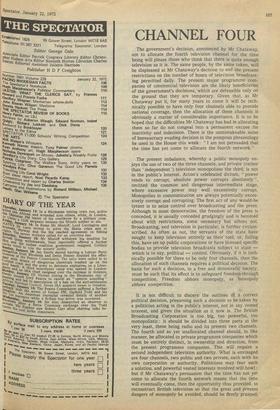CHANNEL FOUR
The government's decision, announced by Mr Chataway, not to allocate the fourth television channel for the time being will please those who think that there is quite enough television as it is. The same people, by the same token, will be displeased at Mr Chataway's decision to end the present restrictions on the number of hours of television broadcasting permitted daily. The present major programme companies of commercial television are the likely beneficiaries of the government's decisions, which are defensible only on the ground that they are temporary. Given that, as Mr Chataway put it, for many years to come it will be technically possible to have only four channels able to provide national coverage, then the allocation of these channels is obviously a matter of considerable importance. It is to be hoped that the difficulties Mr Chataway has had in allocating them so far do not congeal into a permanent excuse for inactivity and indecision. There is the unmistakeable noise of bureaucracy evading decision in the pompous phraseology he used in the House this week : " I am not persuaded that the time has yet come to allocate the fourth network."
The present imbalance, whereby a public monopoly enjoys the use of two of the three channels, and private (rather than ' independent ') television monopolises the third, is not in the public's interest. Acton's celebrated dictum, "power tends to corrupt, absolute power corrupts absolutely ", omitted the common and dangerous intermediate stage, where excessive power may well excessively corrupt. Monopolies in communication are always potentially excessively corrupt and corrupting. The first act of any would-be tyrant is to seize control over broadcasting and the press. Although in most democracies, the freedom of the press is conceded, it is usually conceded grudgingly and is hemmed about with restrictions, some necessary but others not. Broadcasting, and television in particular, is further circumscribed. As often as not, the servants of the state have sought to keep television entirely as their tool; or, failing this, have set up public corporations or have licensed specific bodies to provide television broadcasts subject to state — which is to say, political — control. Obviously, if it is technically possible for there to be only four channels, then the allocation of such channels requires a political decision. The basis for such a decision, in a free and democratic society, must be such that its effect is to safeguard freedom through competition. Freedom abhors monopoly, as monopoly abhors competition.
It is not difficult to discern the outlines of a correct political decision, presuming such a decision to be taken by a politician acting in the public's interest, not in any vested interest, and given the situation as it now is. The British Broadcasting Corporation is too big, too powerful, too monopolistic : it should be divided into three parts at the very least, these being radio and its present two channels. The fourth and as yet unallocated channel should, in like manner, be allocated to private programme companies which must be entirely distinct, in ownership and direction, from the present programme companies. This will require a second independent television authority. What is envisaged are four channels, two public and two private, each with its own corporation or authority. Politicians may fear such a solution, and powerful vested interests involved will howl : but if Mr Chataway's persuasion that the time has not yet come to allocate the fourth network means that the time will eventually come, then the opportunity thus provided, to reconstruct British television so that the great and present dangers of monopoly be avoided, should be firmly grasped.










































 Previous page
Previous page